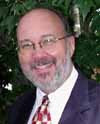In the October issue of our church newsletter which went to print the second week in September, I commented on the economic issues that were confronting us. I reprint it here more or less as a lead in to an episode of the Colbert Report in which Stephen Colbert says it better (and funnier) than I ever could. His comments follow the failure of the House to pass the so called "bailout" on September 29th and how we need to have faith... in "the Market." Check it out here... it's a hoot and we all need a bit of that:
Talking about the economy has become a national preoccupation. It is remarkable how much power we attribute to this mysterious entity by the way we think and talk about it, so much so that the state of the economy now has the power to determine the state of our collective consciousness. Our mood goes up and down like a roller coaster along with the Dow and the price of oil. Could it be that the way our nation regards the economy has become a form of neo-idolatry, the golden calf of post-modernism, a god like being unto itself?
In the March 1999 issue of The Atlantic, Harvard Theology Professor Harvey Cox wrote an article entitled; “The Market as God” in which he observed that there are compelling similarities between the ways that economists talk about “The Market” and theologians talk about God: “…there lies embedded in the business pages an entire theology, which is comparable in scope if not in profundity to that of Thomas Aquinas or Karl Barth.” The entire article can be found here: www.theatlantic.com/doc/199903/market-god
But just because economists are starting to sound like theologians doesn’t mean we have to buy into their idolatry. This year, our annual seven week fall series will be based on the book Spiritual Economics: The Principles and Process of True Prosperity by Eric Butterworth. This is a timely topic. In his typically clear and direct fashion, Eric Butterworth tells us:
“You are not responsible for what is said in the Wall Street Journal or what comes out of Washington in the form of economic indicators, but you are very much responsible for what you think about these things. You cannot afford to let the so-called experts decide how you are going to think and feel.”
True prosperity is measured by the state of our consciousness not the state of our bank accounts. Eric Butterworth brings a refreshing and much needed perspective to the subject that is free from magical thinking and dogmatic attitudes about manifesting and tithing. Most importantly, he stays focused on the primary aim of all of our teachings which is to show us how to become self liberated, fully functioning human beings instead of using spirituality to justify egocentricity and materialism.
In his forward to the 1998 edition of Spiritual Economics, David F. Miller, the former vice chairman and COO of the J.C. Penny Company Inc. writes: “Advancements in science, art, and indeed economics, all arise from the same source, the creative mind that taps into the inner Self and eventually finds expression in our actions.”
Our task as human beings is to awaken to the presence of that creative mind and learn how to draw upon the strength and wisdom of our true Self as we navigate the inevitable ups and downs of the fullness of life which includes the physical world and the karmic effects of our own actions and those of others. Spiritual economics is about taking responsibility for our own consciousness in order to find greater freedom and a sense of confidence (dare I say hope?) that humankind is up to any challenge that we may encounter.
Subscribe to:
Post Comments (Atom)

No comments:
Post a Comment